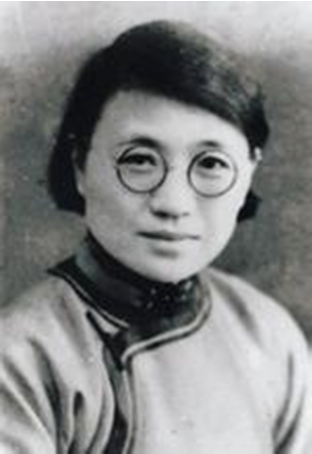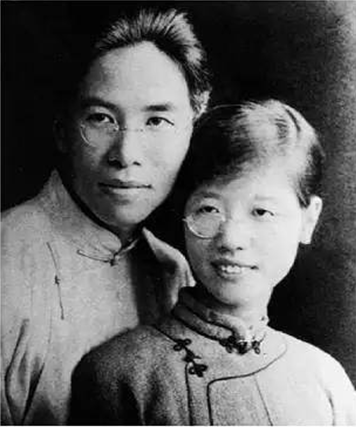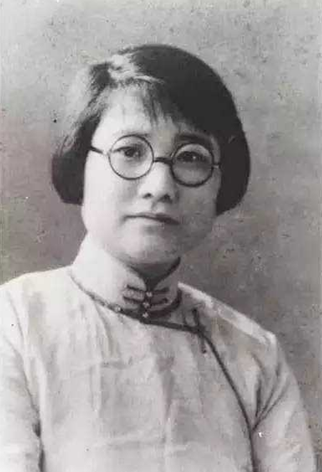“Some females in Wuhan University represent ‘Jia’, and they hold up half the sky of our university.” Said President Dou Xiankang in an interview on Women’s Day. The word “Jia”, an ancient woman’s jade ornament, forms the phrase “Luojia”, the name of the most famous mountain in which WHU’s campus is situated by and also an alias of WHU.
When listing the women who were as respected as “Jia”—the jade of WHU, Dou put the “Three Musketeers of Luojia” in first place. They were three excellent literati living in WHU between the 1930s and 1940s. Often bonding together to immerse with littérateur and artists, they are often addressed as one literary clique.
Yuan Changying: the peacock of Liling

Yuan Changying
Yuan Changying taught drama and French in WHU for more than 40 years, during which she wrote lots of dramas, proses, and monographs, including The Peacock Flies to the Southeast, a namesake play adapted from a famous long narrative poem in ancient China. After the play became a great hit, Yuan was nicknamed ‘the peacock of Liling’ since she came from Liling.
Both the poem and the play told the same sad love story of Liu Lanzhi and Jiao Zhongqing. In the original poem, Liu was a beautiful and virtuous woman who loved her husband Jiao Zhongqing sincerely. Jiao also loved his wife but had to divorce her under the pressure of his mother. At last, the couple both committed suicide for the sake of their love.
The original story omits some details such as why the mother disliked her daughter-in-law without any reason, resulting in the predomination of an aversion for the evil mother-in-law for thousands of years. However, in the adapted play Yuan focused on the conflicts between the mother and son as well as that of couples, creating multi-dimensional characterizations of each role. Yuan showed her sympathy to the discovert old woman who did not learn how to share her son’s love with the daughter-in-law.
This adaptation and many of her other works were highly praised by the public. In 1976, Catherine Lee, an American writer, began to study her dramas, especially The Peacock Flies to the Southeast. Elisabeth Eede, a professor in Norway, visited Yuan’s daughter to know more about Yuan. Hu Qiaomu, Secretariat of the Communist Party of China’s Central Committee, thought that “Works like The Peacock Flies to the Southeast shall not be forgotten.”
Luckily, Yuan Changying’s personal love story was not sorrowful at all. Her husband was Yang Duanliu, a famous economist. They met in the United Kingdom where Yuan was studying in the University of Edinburgh and Yang in the University of London. From then on, they travelled around Europe together, taught in WHU together, suffered in Leshan together, and returned back to WHU together. After so many ups and downs, they still showed no sign of losing that glow of love and fidelity.
Ling Shuhua: China’s Katherine Manthfield

Ling Shuhua and Chen Xiying
Ling Shuhua was also quite an exuberant writer and her literary creations involved different types of literature, including drama, novel, and prose. Unlike the other two, Ling did not teach in WHU. She was regarded as a WHUer because she was married to Chen Xiying, a professor of WHU.
Born into a big family, Ling Shuhua got the chance to learn painting from excellent artists, who not only made her a gentle and cultivated artist, but also helped her to write from the perspective of a painter. However, Ling had a large branch of siblings. Less attention from her parents resulted in Ling’s extreme sensitivity to girls’ thoughts and interest in writing stories of miserable women who were oppressed by the feudal code of ethics. In fact, she wrote many novels describing Chinese women’s life.
Ling’s works are often compared with that of Katherine Manthfield, who also liked to describe scenes from an artist’s view and wrote about girls in suffering and their writing styles were both influenced by Anton Pavlovich Chekhov. Ling was first called China’s Katherine Manthfield by Xu Zhimo, one of the most famous poets in China. Xu was also a fan of Manthfield. He translated Manthfield’s novels and poems into Chinese and praised this lady with passionate words. Comparing Ling Shuhua to Manthfield was probably the highest compliment he could ever make for Ling.
Su Xuelin: a Sherlock Holmes in literature

Su Xuelin
Su Xuelin was a Sherlock in literature. She devoted to uncovering the stories behind classical works, among which the stories of Qu Yuan and Li Shangyin were her favorite. Qu Yuan was a famous and patriotic poet who demonstrated his love for his country and his pursuit for utopia with beautiful words in the Warring States Period. In Qu Yuan’s works, myth was an important way to illustrate the author’s ideas, which drew Su Xuelin’s attention. From 1943 to 1973, she spent 30 years on Qu’s works, and wrote about 70 articles to analyze how Qu Yuan’s myths were related to the myths of Western countries. Besides, Li Shangyin, as a poet in the Tang Dynasty, always wrote poems with various meanings. Most of Li’s poems seemed to be love poems, but they were complicated and confusing, leaving readers with various guesses. Su Xuelin was also interested in the true meaning of those poems. After reading plenty of documents and articles, she came to the conclusion that because Li’s lovers were those he dared not to love so that he could only show his love with elusive words.
The truth that Su Xuelin uncovered became a new way for people to understand Qu Yuan and Li Shangyin, earning much compliments for Su. As a matter of fact, she liked to be a Sherlock, “I enjoy the feeling of finding the truth”, Su said.
Su also wrote essays and novels, including those praising her friends. Yuan Changying became her heroine several times. “Changying is very polite and considerate”, Su wrote, “She perseveres with her study in drama and other types of literature, and does a good job.” Ling Shuhua was also in her articles. "Shuhua was very beautiful, I really love her being a romantic poet", she wrote in Ling Shuhua and her articles.
These three talented friends lived together in Luojia, making great contributions to literature in an age where women in China were expected to stay at home, doing nothing but taking care of their children and husbands. In 1990, another talented woman who was living in an age when women's status has been promoted greatly, showed her respect to the three predecessors when she wrote, "Had it not been for the strive of Su Xuelin, Ling Shuhua, Yuan Changying and many other great women, there would not have been women's liberty, freedom and equality. They used words as their weapons, and found their place in the world. Their contribution was commendable and fruitful."
Edited by Li Minjia, Sun Jingyi, Edmund Wai Man Lai & Hu Sijia